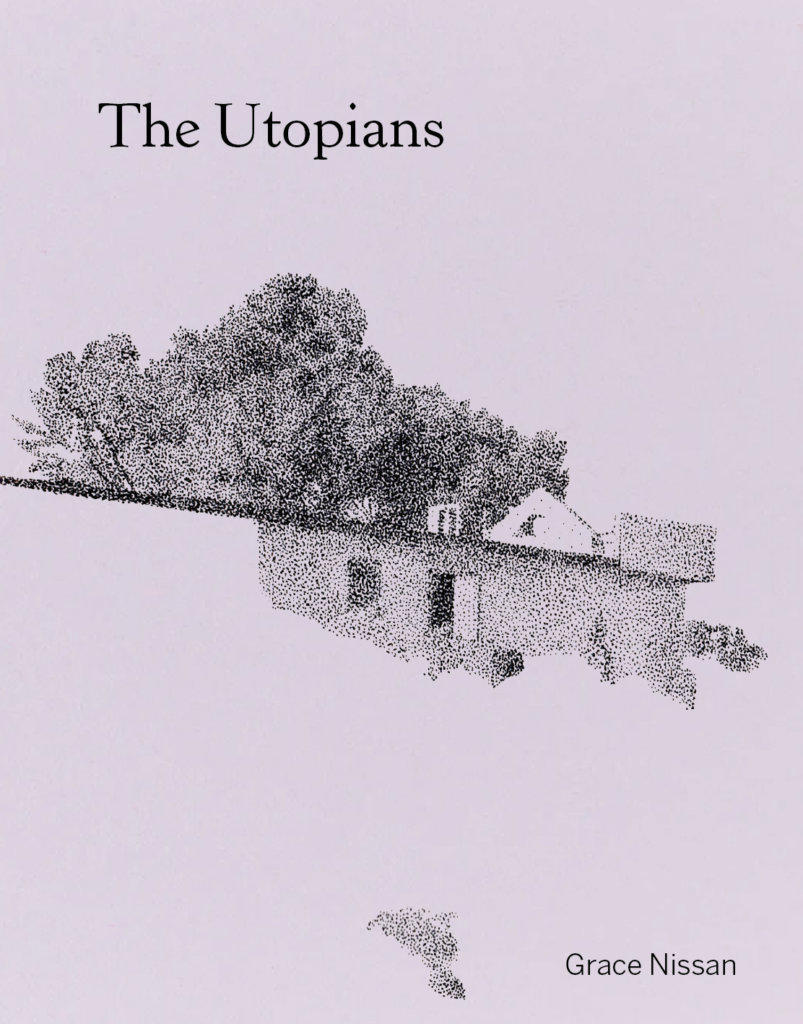account of the origin
you didn’t accept
as though having a good memory
the great army of unemployed
music

account of the origin
you didn’t accept
as though having a good memory
the great army of unemployed
music
Built around a sequence written entirely with language from Thomas More’s Utopia, The Utopians invents a new world, from the pieces of the old one, to formally explore the contradictions of liberation. A series of letters to Thomas More, and a poem called “THE WORLD” about Utopia’s vexed escape, encircle the remixed no-place as they elaborate Utopia’s double edge.
Grace Nissan is the author of The City Is Lush With / Obstructed Views (DoubleCross Press), as well as the translator of kochanie, today i bought bread by Uljana Wolf (World Poetry Books) and War Diary by Yevgenia Belorusets (New Directions / isolarii). Their translations of Yevgenia Belorusets were exhibited in the 59th Venice Biennale. They received a National Endowment of the Arts Translation Fellowship to translate Ann Cotten’s Banned! An Epic Poem into English.
Using mostly the para-colonial language of Thomas More’s Utopia, Grace Nissan has made an almost shockingly compelling book out of a formal constraint as sharp and absurd as the limitations of living in these trivial, awful, genocidal, yearning times. Nissan’s remixed no-place reverberates with (political) desire’s painfully promising residue, something like the stain left on a mirror by a backwards look at ruin. Squeeze the mirror! Break language with language! I’m grateful for this book.
Hannah Black
Rewriting Utopia using, mostly, Thomas More’s own language, Grace Nissan poses in a different way a classic organizer’s question: how do we turn what we have into what we need to get what we want? And why does that process 'look so much like suffering … like suffering plus change'? Nissan’s translation—irreverent, taunting, sometimes affectionate, 'based on death'—wrestles the communist project into a formal principle, in which abolition or invention is only possible through reworking the material of actually existing hell. It’s as nimble and daring an experiment as it’s useful to think with.
Kay Gabriel
In Grace Nissan's The Utopians, the reader finds themselves immersed in a disjointed, paratactic language of a new world, though it isn't totally clear as to what sort of world it might be. Instead, via cut-up appropriations from Sir Thomas More's Utopia and lyric murmurings of personal transformation and radical upheaval, Nissan's work hurls us toward ‘the world I couldn't live in to abolish.’ It is here, in this recognition of non-relation coupled with a yearning for destruction, that we find one of Nissan's forebears—Robert Glück, who writes in his ‘Long Note on New Narrative’ that he writes ‘to invoke what seemed impossible—relation itself—in order to take part in a world that ceaselessly makes itself up.’ Indeed, Nissan's book subtly salts the earth reigned over by ‘territorial lust and imperial phantoms’ in a strangely moving exegetical poetry that ceaselessly leans toward liberation.
Ted Rees
ISBN: 978-1-946604-36-1
Trade Paperback
128 pp, 5.5 x 7 in
Publication Date: May 01 2025